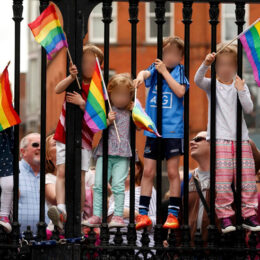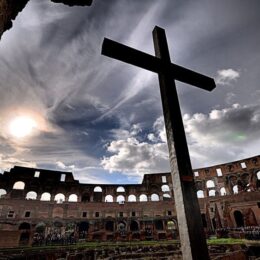FrontPageMag | by Mark D. Tooley | Nov. 12, 2009
Leftist church elites are fondly remembering the Fall of the Berlin Wall as though they could claim some credit for its fall. Conveniently, they forget their own complicity with the former tyrants of East Europe and the Soviet Union.
“Christian hope and perseverance contributed significantly to the fall of the Berlin Wall”, World Council of Churches (WCC) chief Samuel Kobia recently declared. True enough. Millions of Christians and other people of faith, despite persecution and martyrdom, endured for decades under communist rule. But their perseverance owed little to groups like the WCC and other leftist Western church groups, who cheerfully demanded appeasement of the old Soviet Bloc as the price for peaceful coexistence. These church leftists prioritized world “peace” over solidarity with oppressed fellow religionists behind the Iron Curtain, whose suffering was too inconvenient for ecumenical public attention.
Leftist church groups in the West during the Cold War’s final decades dealt almost exclusively with government controlled, or coerced, church groups in the East Bloc, pretending they were exclusively legitimate voices for Christians under communism. That these East Bloc church bodies had little to no freedom to disagree with communist platitudes did not bother “peace”-minded Western prelates, who cherished the photo ops, superficial good will, and faux ecumenical solidarity of East-West church relations. Besides, stopping nuclear war, U.S. imperialism, and the Reagan Administration were all goals that leftist churchmen in the West could readily share with puppet or intimidated churchmen in the East.
“When we celebrate today twenty years of the fall of the Berlin Wall, which marked the end of the cold war era, let us remember the faith and the courage of all those people who gathered in the churches and became the nucleus for the movement of change,” the WCC’s Kobia further commented, as if the WCC could seriously claim credit for Christian resistance to Soviet Bloc repression. “They taught us that Christian faith can inspire a resistance movement against fatalism and despair – a lesson which is as important today as it was twenty years ago,” he continued. Shamefully, Kobia’s words must mean little to victims of today’s tyrants. Today, as 20 years ago, victims of communist rule in places like North Korea and Cuba must still endure the silence, and even active collaboration of the WCC and its friends with the victimizers.
Kobia boasted that prayers and candle light vigils in East German Lutheran churches “inspired and encouraged people to confront the power of police and secret service in a very effective and peaceful way.” But the WCC was not the source of this resistance to communism. Unfortunately, the WCC et al had previously seen these East Bloc Christians, or at least their government approved representatives, as little more than stage props for opposing Western resolve and rearmament during the Cold War’s final years.
Proving that the WCC has learned nothing over the last 20 years, Kobia intoned that there are “still many walls separating humankind: the ‘Demilitarized Zone’ between North and South Korea, the ‘Security Wall’ on the occupied territory in Palestine, but also the walls of injustice, racism and prejudice that separate rich and poor, stigmatize persons suffering from HIV and AIDS and destroy the lives of many people.” Of course, Kobia and his fellow leftist religionists cannot distinguish between a prison fence and security fence. Nor can he differentiate between Marxism-Leninism, which deliberately murdered tens of millions, and unintentional global economic disparities.
Revealingly, former WCC chief Konrad Raiser, in his own recent commentary about the Berlin Wall anniversary, carefully noted that groups like the WCC were discredited by their Soviet Bloc ties. “Ecumenical organizations came under scrutiny as well in view of their relationships with representatives of the former system and their lack of effective support for the struggles of dissident movements,” he admitted. “In some cases, ‘ecumenism’ even became a term to be avoided,” observing that the Orthodox churches in Georgia and Bulgaria withdrew from the WCC.
After the East Bloc fell, Romanian pastor Laszlo Tokes, who helped spark the anti-Ceausescu revolt, complained that groups like the WCC refused to “present the true conditions of churches Romania and [offered] a pretension that in our country everything is fine, the churches perform their mission in peace and freedom.” Meanwhile, he said, Romanian churches elites under Ceausescu’s boot obligingly misled the ecumenical movement and “under the label of ecumenism successfully represented the direct interests of an inhuman, ungodly and oppressive regime – all at the expense of their own believers.”
At least Roman Orthodox Church leaders, after Ceausescu’s fall, issued public “regret that under the dictatorship some of us may not always have shown the courage of the martyrs, and have not publicly acknowledged the suffering of the Romanian people,” instead “praying the obligatory tribute of artificial praise to the dictator.” The WCC offered less sorrow, only admitting its “mistaken judgment in failing to speak adequately” about Romania. More defiantly, the WCC’s then chief Emilio Castro, a long-time virtual fellow traveler, unapologetically opined: “What do we need to repent of if we were trying to help the Romanian people?”
Within hours after the Berlin Wall fell, United Methodist official Janice Love of the WCC’s Central Committee starkly warned against a “new-found triumphalism about capitalism” that is “uncritical, unwarranted and chauvinistic.” Naturally, she urged “more creative work” on “alternative economics futures for our selves in the United States as well as other parts of the world.”
Love was speaking to United Methodist Council of Bishops, who were literally meeting as the Berlin Wall crumbled. The bishops dutifully commended East Europeans for “openness and growing self-confidence” while ominously warning against imposition of Western value systems. Bishop Rudigor Minor of East Germany told his fellow bishops, meeting in North Carolina, that he hoped Marxism was not dead. “Marxism has insights into power that we can learn from,” he assured his colleagues, such as its critique of capitalism’s “competition structures.” He suggested Christians should remain alarmed about the free market’s “profit-maximizing at the expense of the Third World.” Admitting that Marxism as practiced in East Germany was a “flop,” Minor still hailed Marxism’s “utopian element” and assured his fellow bishops that, “Marxists are still relevant.”
Very few on the east side of the Berlin Wall agreed with the Methodist bishop. And fewer still have illusions that leftist Western church elites cared about oppressed Christians under the old Soviet Empire, any more than they care about today’s victims of remaining communist regimes or Islamic theocracies. Christians who suffer persecution and labor against tyranny around the world fortunately look to higher and more reliable inspirations than discredited Religious Left groups like the WCC.
. . . more



